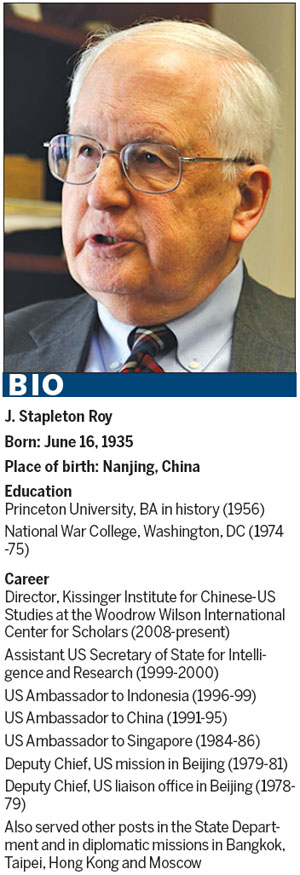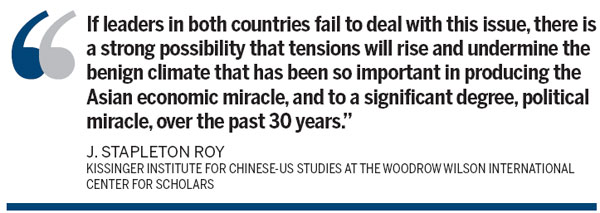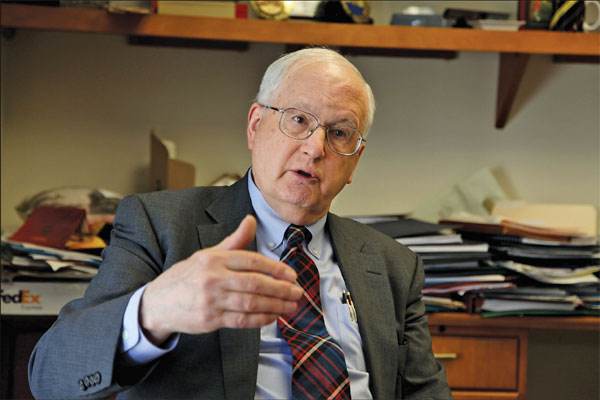US-China: An evolving relationship
Updated: 2013-03-15 11:51
By Chen Weihua (China Daily)
|
|||||||||
|
J. Stapleton Roy, former US ambassador to China, says he would like to see presidents Obama and Xi form a special relationship which will help strengthen bilateral ties. Sun Chenbei / China Daily |
Former ambassador J. Stapleton Roy says both countries must halt drift toward strategic rivalry, reports Chen Weihua from Washington.
Former US Ambassador to China J. Stapleton Roy, who was born in China, has been involved in many ups and downs of China-US relations.
Despite what he sees as a "frightening" array of domestic and foreign policy challenges now facing leaders of both countries, Roy said no task is more important than stopping what he feels is the current drift in US-China relations toward strategic rivalry.
"If leaders in both countries fail to deal with this issue, there is a strong possibility that tensions will rise and undermine the benign climate that has been so important in producing the Asian economic miracle, and to a significant degree, political miracle, over the past 30 years," said Roy, 77, who was ambassador to China from 1991 to 1995 when China's relations with the West were strained.
In Roy's view, the two nations are locked in the traditional problem of an established power facing a rising power, which often has resulted in wars. The good news, he said, is that leaders in both countries are aware of the historic precedent and are determined to not let history repeat itself.
"They have not yet been capable of bringing their behavior pattern into conformity with the goal of having a long-term stable relationship. That's the big strategic challenge our leaders face," Roy told China Daily in an interview at the Washington-based Kissinger Institute for Chinese-US Studies at the Woodrow Wilson International Center for Scholars, where he is the director.
There's a risk of the US being drawn into an unnecessary conflict over the territorial disputes between China and some US allies in East Asia, which have defense treaties with the United States, Roy said. "We do not want to be pulled into a conflict with China by our friends and allies," he said.

Tension has grown, though subsided somewhat lately, between China and Japan over the Diaoyu Islands in the East China Sea after the Japanese government nationalized the islands late last year. Meanwhile, tensions also ran high in the middle of last year around the Huangyan Island in the South China Sea between China and the Philippines.
Roy said the US faces the challenge of reassuring friends and allies that it's a reliable friend, while also restraining their behavior so they don't become more provocative toward China.
Roy said such US behavior if read properly by China can actually contribute to mutual trust, implying that many Chinese still wrongly regard US policy in Asia, especially the rebalancing toward Asia strategy, as aiming to contain China.
The question for both US President Barack Obama and his Chinese counterpart Xi Jinping is whether they can find a solution to this conundrum, Roy said.
"There is a disconnect between the high -level desire at both sides not to have our relationship drift towards rivalry and confrontation and the way we were actually behaving, which is driving us in that direction," he said.
While China's military develops the so-called anti-access, or counter-intervention, capabilities to make it difficult for US military to operate in the water and air space adjacent to China, the US has released an air-sea battle concept that requires strikes on the Chinese mainland and could escalate into a dangerous confrontation, Roy said.
He described conflict of this scale as unlikely and preventable. "But this action, reaction process holds the potential of what one writer called a 'military capabilities competition of unlimited duration'," he told a meeting at the East-West Center in Hawaiil last month .
Roy said it's not a trivial thing for the two countries to engage in such competition, considering a growing Chinese GDP and a US haunted by budgetary constraints. Today, the US spends far more on defense than the next 12 nations combined.
Critical test
Roy said that if such a strategic challenge isn't addressed now, it will be more difficult to manage in the future. "It will be a critical test for leaders of both countries," he said.
It's still possible for the two countries to make progress in that regard, Roy said, adding that it requires both nations to change not only their thinking, but their behavior pattern.
A lack of military exchanges over the past decades has long been considered problematic compared with a wide range of exchange and cooperation on other fronts. While the US has blamed China for being passive in this regard, one Chinese defense official, who spoke to China Daily on condition of anonymity, said that the situation was just the opposite.
China was upset when it was not invited to attend last summer's Rim of Pacific naval drill around Hawaii. The large-scale drill, known as RIMPAC, drew 22 nations and 25,000 personnel, including navies from Japan, Russia and India.
In September, however, then Defense Secretary Leon Panetta extended an invitation to China to participate in the RIMPAC 2014, which the Chinese said they will consider positively.
After disruptions from time to time, especially in the case of US arms sales to Taiwan, military exchanges have gained some momentum lately. In the past 10 days, a Chinese military delegation, led by Major General Zhu Chenghu of PLA National Defense University, has been visiting Hawaii and Washington on what Pentagon officials described as a "familiarization exchange."
Roy said the two countries can't build trust simply by talking. "The way you build trust is by saying you will do something and then acting consistently on what you will do," said Roy, pointing to lowering tension on the Korean Peninsula and managing the territorial disputes around China as ways to enhance trust.
Xi-Obama relationship
Roy said the US would like to see Xi establish a relationship with Obama and other US leaders, both Democrats and Republicans. "That will enable us to expand cooperation and better manage where we have competitive interests," he said.
Roy dismissed talk that China and the US are about to enter a new cold war. "You don't have the circumstance for cold war," said Roy, a diplomat in Moscow in the late 1960s during the height of the Cold War. "First of all, our economies are intertwined in a way that is not true at all of any of the countries we had a containment policy for during the Cold War. Secondly, China's rise has been beneficial to the countries around it."
While a cold war requires countries to choose, there is no support in East Asia for a choice between China and the US, according to Roy. "So a new cold war is not a realistic possibility."
Roy, who speaks fluent Chinese and who served as US ambassador to Singapore (1984-86) and Indonesia (1996-99), said it's also wrong to say that the China-US relationship is dominated by competition.
"It does not take into account the enormous economic relations between the two countries," he said. "Trade, after all, is a form of cooperation, not of competition. You have goods, I give you money, it's a cooperative exchange."
China-US relations today have gone way beyond the early 1990s when Roy said he had to explain to Americans the importance of improving relations with China.
Of the many difficulties, he said the first was to get then Secretary of State James Baker to visit China in November 1991, the highest US official visit to China in two years. The just-repaired relations soon took a hit when President George H. Bush decided to sell 150 F-16 fighters to Taiwan in 1992. Roy said he had to handle the problem in Beijing caused by the arms sales.
Roy stayed on as US ambassador to China after President Bill Clinton took office in 1993. Relations were strained by the US linkage of China's human rights records with the Most Favored Nation trade status, and later Taiwan leader Lee Teng-hui's visit to the US in June 1995, just as Roy finished his term in China.
For the Chinese government, the Yinhe incident, in which the US government accused a Chinese container ship of carrying materials for chemical weapons to Iran, was another major issue during Roy's years in China.
In late July, 1993, the US Navy forced Yinhe to stop in the international waters of the Indian Ocean for three weeks. After the Chinese government agreed to a search of the ship by a joint Saudi-US team, the final result proved the Chinese innocent. The US' subsequent refusal to apologize made many Chinese angry about US arrogance.
Roy said he personally handled the issue with the Chinese government. "We had good cooperation from the Chinese government. The problem was Washington. The intelligence community was convinced that our information was accurate, and it turned out to be inaccurate," he said.
After Clinton delinked the MFN with China's human rights record in 1994, more and more senior US officials went to China to expand relations.
"So I had a lot of different moods during my period in China," said Roy.
Sichuan dialect speaker
Roy said he feels very comfortable living in China since he has lived there for a long time since his childhood, and his parents' closest friends were all Chinese.
Roy's father, Andrew Tod Roy, went to China in 1930 as a Presbyterian missionary and later taught at Nanking University in eastern China's Jiangsu province.
The family followed the school when it moved to Chengdu in west China's Sichuan province in 1938, soon after the Japanese invasion. During the seven years in Chengdu, Roy played with children of Chinese professors and learned to speak the Sichuan dialect.
He joked about feeling odd at the time hearing his parents speaking Putonghua, the standard Mandarin. "I thought their accent was terrible. I was embarrassed when they spoke Chinese. It didn't sound right to my ear when Sichuanese sounded right," Roy said.
Conditions were harsh in Chengdu those days with no paved roads, but only cobbled streets, and rickshaw was the means of transportation. "I grew up wearing caohai," recalled Roy, referring to what straw sandals are called in the Sichuan dialect.
He said his favorite childhood game was the little metal hoop. "You ran around with bamboo, you would keep pushing and run," said Roy.
The family returned to the US in 1945 after the War of Resistance against Japanese Aggression, and they returned to China in 1948 to find themselves in a communist revolution.
Roy was in Shanghai attending the Shanghai American School in May 1949 when the People's Liberation Army took the city.
After the Korean War broke out in 1950, his father became a controversial figure and was expelled by the Chinese government in 1951 and the family returned to the US.
His father, who later returned to China many times, including a trip to attend the 1988 centennial of the Nanking University, was once a well-known professor in China. His elder brother, David Tod Roy, a professor emeritus in Chinese literature at the University of Chicago, has just completed the fifth volume of his translation of The Plum in the Golden Vase (Jin Ping Mei in Chinese).
The novel, first published in 1618, is regarded by many to be the fifth classical novel after the four great classical novels in Chinese history. It was banned in China during Mao's era since its graphically explicit depiction of sexuality has often been compared to Lady Chatterley's Lover in English literature.
"The fact that it is printed by Princeton University Press suggests that it is not considered to be pornography in the United States," said Roy, laughing.
Contact the writer at chenweihua@chinadailyusa.com


 In Photos: 7.0-magnitude quake hits Sichuan
In Photos: 7.0-magnitude quake hits Sichuan
 Li Na on Time cover, makes influential 100 list
Li Na on Time cover, makes influential 100 list
 FBI releases photos of 2 Boston bombings suspects
FBI releases photos of 2 Boston bombings suspects
 World's wackiest hairstyles
World's wackiest hairstyles
 Sandstorms strike Northwest China
Sandstorms strike Northwest China
 Never-seen photos of Madonna on display
Never-seen photos of Madonna on display
 H7N9 outbreak linked to waterfowl migration
H7N9 outbreak linked to waterfowl migration
 Dozens feared dead in Texas plant blast
Dozens feared dead in Texas plant blast
Most Viewed
Editor's Picks

|

|

|

|

|

|
Today's Top News
Live report: 7.0-magnitude quake hits Sichuan, heavy casualties feared
Boston suspect cornered on boat
Cross-talk artist helps to spread the word
'Green' awareness levels drop in Beijing
Palace Museum spruces up
First couple on Time's list of most influential
H7N9 flu transmission studied
Trading channels 'need to broaden'
US Weekly

|

|









